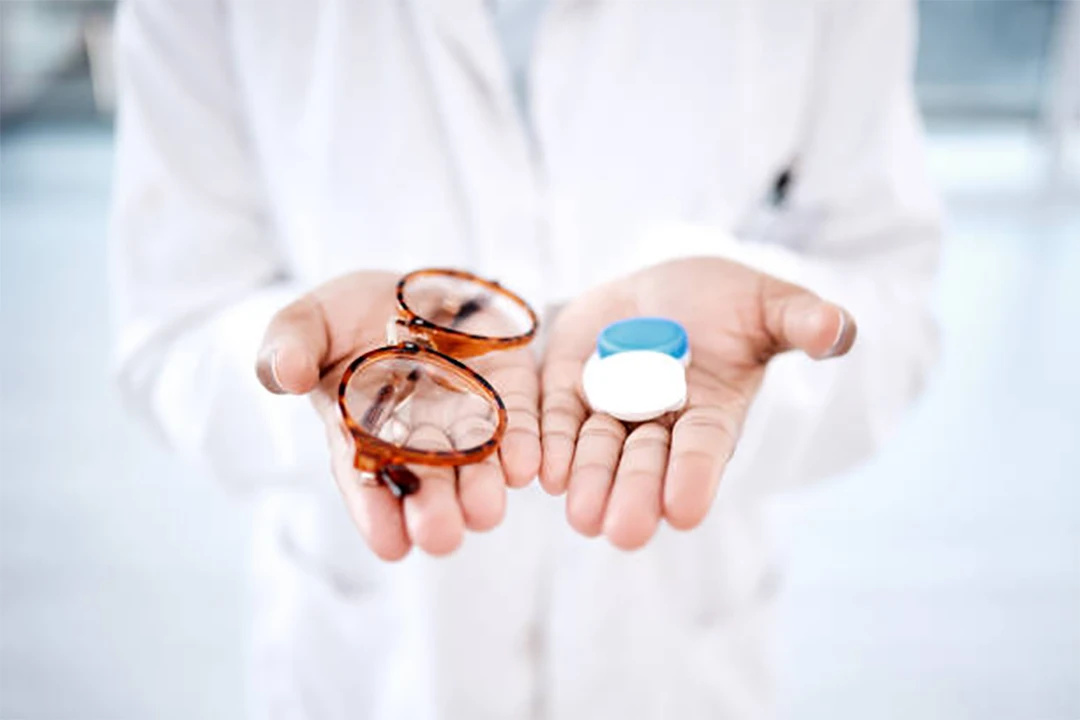
Deciding between glasses and contact lenses is a common dilemma for individuals seeking vision correction. Both options offer distinct advantages and disadvantages, and the best choice ultimately depends on your lifestyle, preferences and specific vision needs. Let’s delve into the world of eyewear and explore the pros and cons of glasses and contact lenses.
Glasses: A Classic and Convenient Choice
Glasses have long been a staple in the world of vision correction, and for good reason. They are readily available, easy to use, and require minimal maintenance. They offer protection from dust and other airborne irritants, and they come in a wide array of styles and colours to suit any personality or fashion preference. Moreover, advancements in lens technology have made glasses lighter, thinner, and more comfortable than ever before.
However, glasses do have their drawbacks. They can fog up in humid environments, limit peripheral vision, and sometimes feel cumbersome during physical activities. Additionally, for those with high prescriptions, glasses can be bulky and distort the appearance of the eyes.
Contact Lenses: The Invisible Alternative
Contact lenses provide a discreet and natural-looking solution for vision correction. They sit directly on the eye, offering a wider field of view and eliminating the visual obstructions associated with glasses. They are also a popular choice for athletes and individuals with active lifestyles, as they don’t slip or fall off during movement.
However, contact lenses require more care and maintenance than glasses. They must be cleaned and disinfected regularly to prevent eye infections. Additionally, some people may experience discomfort or dryness when wearing contact lenses, and they can be more expensive than glasses in the long run.
Factors to Consider
When making your decision, it’s important to consider several factors:
- Lifestyle: Are you active and involved in sports? Do you spend a lot of time outdoors? Your lifestyle can influence which option is more suitable for you.
- Vision Needs: Do you have a high prescription or astigmatism? Certain vision conditions may be better corrected with one option over the other.
- Comfort: Some people find glasses or contact lenses more comfortable than the other. It’s important to choose an option that you’ll feel comfortable wearing throughout the day.
- Budget: Glasses tend to be a more affordable upfront investment, while contact lenses require ongoing purchases of lenses and cleaning solutions.
- Aesthetics: If you’re concerned about how eyewear affects your appearance, glasses offer a wide range of stylish frames to choose from, while contact lenses provide a more natural look.
EyeWise Vision: Your Partner in Choosing the Right Eyewear
Whether you opt for glasses or contact lenses, the most important factor is to ensure that your vision is corrected effectively and comfortably. No matter which you choose, EyeWise Vision Clinic is here to help. Their team of experienced optometrists will conduct a thorough eye examination to assess your vision needs and lifestyle, and provide personalised recommendations for the most suitable eyewear option for you. They also offer a wide selection of glasses and contact lenses, including the latest technologies and designs.
Book a consultation with them today to explore your options and embark on a journey towards clearer, brighter vision.
Comparison between Glasses or Contact Lenses
Comparison table between glasses and contact lenses, highlighting the pros and cons of each:
| Category | Glasses | Contact Lenses |
| Comfort | May feel bulky on face, can slip or fog up in weather. | Sit directly on the eye, no slipping or fogging. |
| Cost | Typically less expensive in the long run. | Can be more expensive due to ongoing purchases (solutions, replacements). |
| Vision Quality | Provide stable vision without directly touching the eye. | Provide more natural vision, move with the eye, and eliminate distortion. |
| Convenience | Easy to put on and take off, no direct eye contact. | Require more handling and cleaning; can be time-consuming. |
| Eye Health | No direct contact with the eye, less risk of infection. | Can cause infections if not handled properly. |
| Lifestyle & Sports | Can fall off or get damaged during sports activities. | Ideal for sports, as they don’t fall off. |
| UV Protection | Some lenses offer UV protection, but most don’t. | Some contact lenses come with UV protection. |
| Astigmatism Correction | Can easily correct astigmatism. | Specialized toric lenses required for astigmatism. |
| Cosmetic Appearance | Can alter appearance, change style with frames. | Invisible, no impact on appearance. |
| Maintenance | Minimal cleaning required, easy to maintain. | Require regular cleaning and replacement, higher maintenance. |
| Suitability for Screen Use | Blue light filter options available. | Less effective for blue light protection. |
| Weather Conditions | Can fog up in cold weather or rain. | Unaffected by weather conditions. |
| Wearing Time | Can be worn all day without discomfort. | Prolonged use can dry out eyes, limited wearing time. |
| Durability | Longer lasting with proper care. | Need frequent replacement (daily, weekly, monthly options). |
Comments
comments